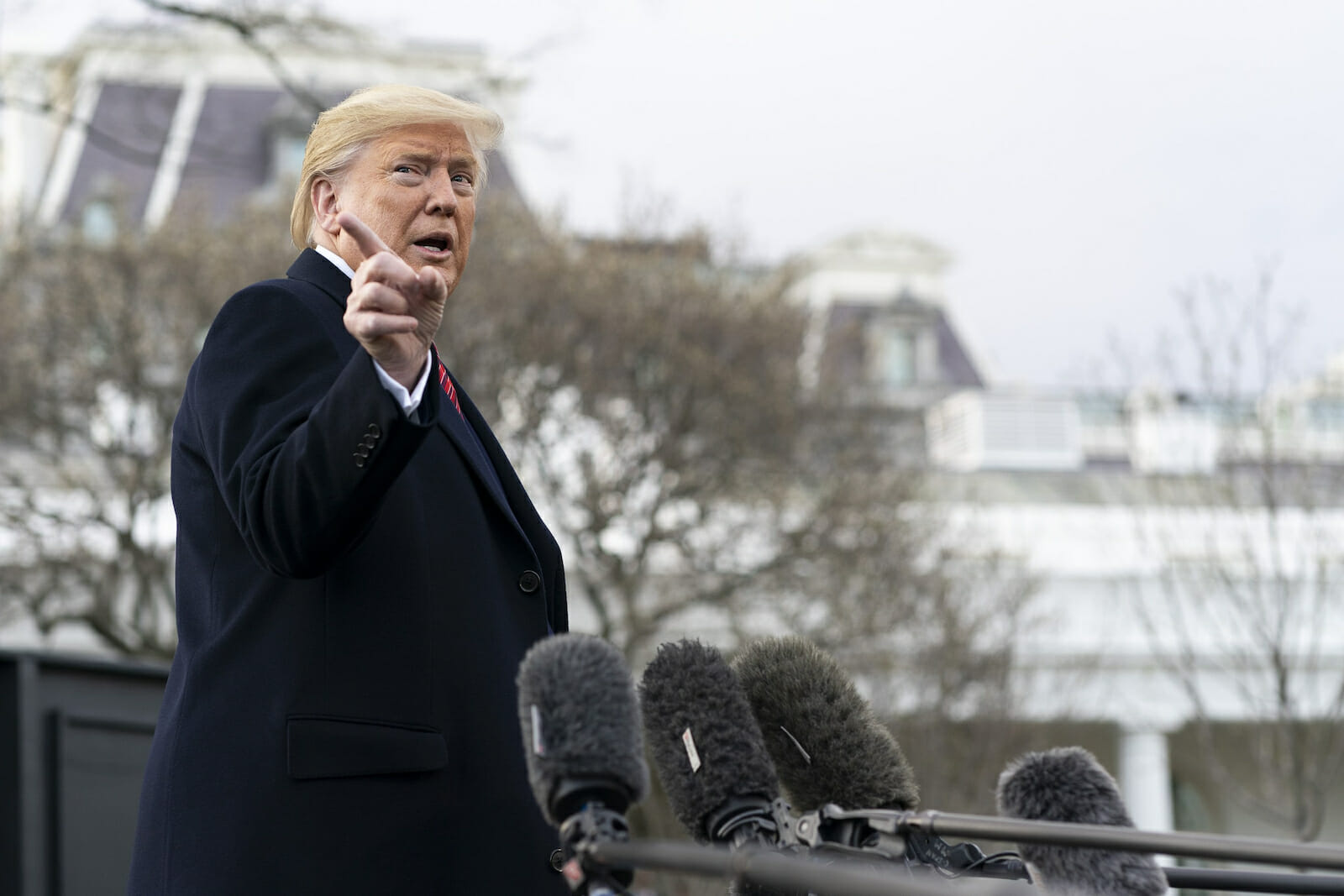
Politics
Trump’s Initial Faux Pas in Dealing with COVID-19
Since the very beginning of Donald Trump’s tenure, his opponents have presented him as unfit for the office and questioned the legitimacy of his presidency. And yet, as succinctly recalled below, the U.S. president has thus far managed to ride out those assaults.
First came the Russia-collusion story. As the dictum goes, the mountain gave birth to a mouse: after months of investigation, the Mueller probe did not find conclusive evidence of the alleged collusion.
Concomitantly with the Russia-collusion claims, Democrats and like-minded pundits began to make dire predictions about the assumedly ill fate that awaited the U.S. economy under Trump’s presidency: House Democratic speaker Nancy Pelosi warned that Trump’s tax reform would lead to nothing less than an economic “Armageddon.” Her assertion was in line with what Bill Clinton’s and Barack Obama’s top economic advisor, Larry Summers, had foretold: a global economic recession within the first 18 months of Trump’s presidency. The prophesied catastrophe, however, didn’t take place: leading U.S. economic indicators have been at, or close to, historic highs – at least until the coronavirus outbreak.
The Ukraine impeachment saga, which for months devoured Democratic lawmakers’ time and efforts, didn’t do the trick either: rather than going down, Trump’s approval rating moved upwards in the wake of the conclusion of the impeachment procedure.
It was in those circumstances, in which Democrats had more than once contested the legitimacy and competence of the U.S. president without success, that Donald Trump delivered his 2020 State of the Union address. Departing from his customary, tweet-like polarizing tone, Trump managed to look “presidential” on that occasion. Judging from the instant polls carried out during that exercise (including by CBS and CNN), the endeavor paid off.
Cue the outbreak of COVID-19 and its arrival on U.S. soil. With that, the president had a precious opportunity to continue on his newly-assumed presidential posture and consolidate his recent gains in approval ratings. For that, he had to rise above partisan lines and soberly point the way forward for dealing with the emerging epidemic.
The opportunity was all the more potentially profitable for Trump as his opponents and like-minded media had begun to politically weaponize the phenomenon. A salient manifestation of the anti-Trumpers’ attitude was given by New York Times columnist Gail Collins and progressive economic pundit Paul Krugman, who separately went as far as creating the word “Trumpvirus” to refer to the China-originated scourge.
So far so good for Donald Trump. Trouble began for him, however, when, instead of sounding the alarm and announcing measures commensurate with the gravity of the looming epidemic, he claimed that the situation was “very much under control in the USA” and added that “the risk to the American people remains very low.” He even likened COVID-19 to the common flu and presented the dramatic fall in oil prices – due to the outbreak of coronavirus – as something “good for the consumer.” Nothing to worry much about, in other words.
By playing down the gravity of the situation, he missed a golden opportunity to prove his detractors wrong. Indeed, after that declaration, Trump’s credibility will be in serious difficulty if the pandemic – as is increasingly the case – spreads over the U.S. territory and begins to take a heavy toll in terms of human lives and public health.
Contrast Trump’s stance with those adopted by his pals Boris Johnson and Benjamin Netanyahu. The British prime minister issued a sober warning about a “possible, very significant expansion” of coronavirus. Israel’s prime minister, for his part, characterized the coronavirus as “the most dangerous [epidemic] in the last 100 years.” In a similar vein, France’s president, Emmanuel Macron, warned his fellow citizens that the coronavirus epidemic was “inevitable.”
By underscoring how serious the problem is, Trump’s peers politically hedged themselves against an aggravation of the epidemics. Thus, as the disease spreads in their respective countries, each of them (unlike Trump) will be in a position to say: “I had foreseen the development since the outset.”
What is more, the outbreak of coronavirus has wreaked havoc on both the supply and the demand sides of the world economy. Indeed, the disease has brought about major disruptions of international supply chains and a check-in business investment (supply side) as well as a dramatic fall in tourism, and air and cruise travel (demand side).
As pointed out by Financial Times Philip Stephens: “A simultaneous shock to supply (all those closed Chinese factories) and to demand (safer to stay at home than to go shopping) will seriously damage economic growth.”
Thus, as economic activity falters – probably to the level of a recession – the U.S. public opinion will likely not fail to recall Trump’s initial underestimation of the impact of COVID-19 and, consequently, will be inclined to put in doubt his lucidness and clairvoyance. A godsend for Trump’s opponents.
Of course, the jig is not up. Trump’s reelection cannot (yet) be ruled out. Whether by drastic confinements or by the marvels of scientific ingenuity or by unforeseen events, the expansion of coronavirus might subside or be overcome. The looming global economic slowdown, in turn, might eventually (though unlikely) be contained through appropriate fiscal and monetary policies. Trump can still change track – he has actually begun to do so by putting forward proposals aimed at countering the severe economic impact of coronavirus and by announcing far-reaching travel restrictions involving continental Europe. Democrats, for their part, can make new blunders during the presidential campaign: don’t underestimate Joe Biden’s propensity to make “mental gaffes” (the so-called “Bidenisms”), or the dangers posed to Democrats by the prospective Senate inquiry on the activities of Biden’s son in Ukraine, or, last but not least, Bernie Sanders’ capacity to throw a monkey wrench into the Democratic camp.
And yet, irrespective of how events unfold in the period leading to Election Day, what can already be affirmed is that Donald Trump made an awkward, politically-damaging debut in the treatment of what has most likely become the defining issue of 2020.

